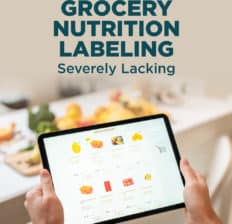This Dr. Axe content is medically reviewed or fact checked to ensure factually accurate information.
With strict editorial sourcing guidelines, we only link to academic research institutions, reputable media sites and, when research is available, medically peer-reviewed studies. Note that the numbers in parentheses (1, 2, etc.) are clickable links to these studies.
The information in our articles is NOT intended to replace a one-on-one relationship with a qualified health care professional and is not intended as medical advice.
This article is based on scientific evidence, written by experts and fact checked by our trained editorial staff. Note that the numbers in parentheses (1, 2, etc.) are clickable links to medically peer-reviewed studies.
Our team includes licensed nutritionists and dietitians, certified health education specialists, as well as certified strength and conditioning specialists, personal trainers and corrective exercise specialists. Our team aims to be not only thorough with its research, but also objective and unbiased.
The information in our articles is NOT intended to replace a one-on-one relationship with a qualified health care professional and is not intended as medical advice.
Study: Online Grocery Nutrition Labeling Severely Lacking
February 11, 2022

Most health-conscious people do their due diligence when buying groceries, reading food labels to ensure they consume the healthiest products they can. However, in a day and age when online shopping has become the norm for many, even when it comes to grocery shopping, online grocery nutrition labeling is severely lacking, according to a January 2022 study conducted and published by Cambridge University.
According to the study authors, “The rapid growth in web-based grocery food purchasing has outpaced federal regulatory attention to the online provision of nutrition and allergen information historically required on food product labels.” That’s bad news for everyone, especially those with severe food allergies.
Online Grocery Nutrition Labeling Study Findings
The goal of this study was simple: to determine “the extent and variability that online retailers disclose required and regulated information and identify the legal authorities for the federal government to require online food retailers to disclose such information.” In order to do this, the researchers scanned 10 products from nine national online retailers in the United States “and conducted legal research using LexisNexis to analyse federal regulatory agencies’ authorities.”
What they found was alarming, particularly for those who rely on nutrition labels to avoid allergens. In the U.S., the Food and Drug Administration, Federal Trade Commission and Department of Agriculture require that foods labels include nutrition facts, ingredients, common allergens and the percent of juice in fruit drinks, among other things, but online grocery nutrition labeling is far less regulated than the products stocking store shelves. As a result, many retailers, whether intentionally or not, fail to provide even the most basic information required by law.
As far as the required information, the Cambridge University researchers found that, on average, only 36.5 percent of the scanned products had “present, conspicuous and legible” required nutritional info. The online grocery nutrition labeling examined only displayed potential allergens 11.4 percent of the time, while 54.2 percent of the time did include ingredients lists.
On the flip side, 63.5 percent did provide voluntary nutritional claims, which is a positive, though obviously less important than providing the information required by safety authorities.
The authors of the online grocery nutrition labeling study ultimately concluded:
Information regularly provided to consumers in conventional settings is not being uniformly provided online. Congress or the federal agencies can require online food retailers disclose required nutrition and allergen information to support health, nutrition, equity and informed consumer decision-making.
Food Label Tips
When buying food, whether in-person or online, you really should check food labels carefully. Not only should in-person and online grocery nutrition labeling include the required info mentioned above, but you should keep an eye out for any ingredients that sound unnatural and of course be very aware of the presence of foods you are allergic to.
Be wary of the following terms, which the Environmental Working Group label decoder cautions can be misleading because the regulations to use these labels are rather lax:
- Animal Welfare Review
- Cage Free
- Free-range
- No Hormones Added
- Humanely Raised
- Farmed Fish
- Lean/Extra Lean
- Natural
- No Nitrates or Nitrites Added
- Omega-3 Fortified Eggs and Milk
The most trust-worthy food labels are ones with third-party authentication, and the most reliable third parties ensure the animals and farms the food is sourced from are free from antibiotics and synthetic growth hormones, allow animals to live and roam outdoors, and have the farms inspected every 12 to 38 months. Of course, certified organic is preferred, and you want to find the cleanest fruits and vegetables possible that are free from pesticides as well.
Conclusion
- A January 2022 study from Cambridge university found that just 36.5 percent of food products scanned from online retailers had required nutritional info prominently displayed.
- More alarmingly, only 11.4 percent of the time did the online grocery nutrition labeling indicate common allergens, a serious issue for those with food allergies.
- The researchers believe food regulators in the U.S. have the tools at their disposal to enforce proper online grocery nutrition labeling and should make a greater effort to enforce the rules as online retail continues to rise.
- This study highlights the many issues with food labels, whether online or in-person.
- Be sure to check nutrition and ingredients labels, and look for foods with reputable third-party authentication to ensure your food’s quality and avoid food allergy issues.










